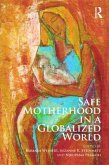There are few rules at Savard's. Women may come and go as they wish, and referrals to other services are made only when a woman has indicated interest in taking action on her own behalf. It is a model that aims to provide a safe haven for the chronically homeless. Urban anthropologist Rae Bridgman, in careful and intimate detail, explores the perspectives of the women who work and live at Savard's, a unique shelter for homeless women. In this groundbreaking Canadian study, Bridgman uses the design and development of one particular shelter - a housing model developed by women for women - as an opportunity to document Savard's original vision and what happened once the project opened. Safe Haven traces the evolution of this type of shelter, showing multiple ways of presenting long-term research that provides qualitative and useful information for researchers, policy-makers, service providers, and activists. Featuring many hours of participant observation as well as narratives, analysis, and poetic fragments, Safe Haven emerges with a distinct picture of the chronically homeless and those on the frontlines of this lifesaving service.








